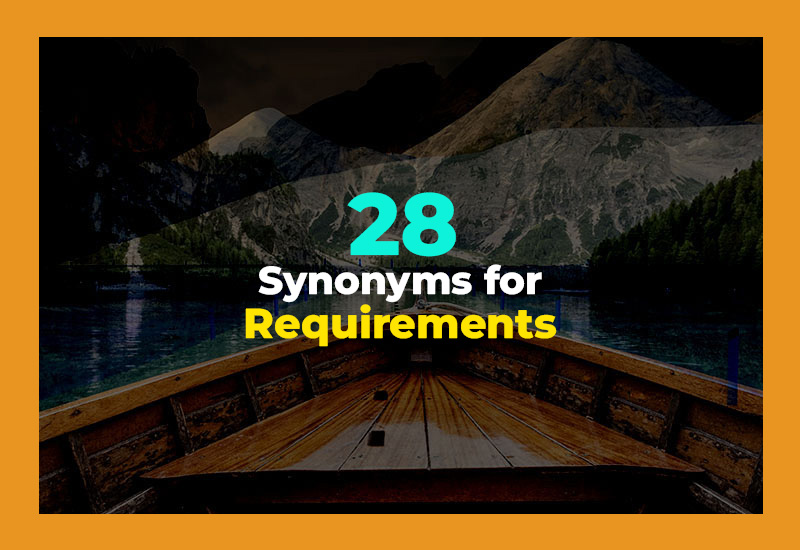You know how sometimes you just need a word that isn't “requirement”? Maybe you’re tired of repeating the same term over and over in your writing. Don’t worry; I’ve got you covered! Here are 28 cool synonyms for “requirements” that can help spice up your content. Whether you’re drafting a report, writing an email, or making a presentation, you’ll find these words super handy.
1. Prerequisite
A “prerequisite” is something that needs to happen before another thing can happen. It's often used in education or jobs to describe necessary skills or knowledge. For instance, a college degree is a prerequisite for applying to certain jobs. Similarly, basic computer skills are prerequisites for many positions in the tech industry. This word can be used to show that something must come first. So, next time you’re explaining something that needs to be done beforehand, try using “prerequisite”!
2. Condition
A “condition” refers to a specific requirement or stipulation that must be met. It’s often used when you're outlining terms or rules. For example, the condition for the loan approval is that you must have a stable income. Or, when buying a car, the condition of the vehicle can affect the price. This word is great for showing that something must be true or in place to move forward.
3. Specification
A “specification” is a detailed description of what is required or expected. This word is perfect for technical contexts, such as construction or product design. For example, the product’s specifications include a 12-hour battery life. Or, in a job description, the specifications might state the necessary qualifications. It's great when you need to be clear and specific about what's needed.
4. Stipulation
A “stipulation” is a condition or requirement that's part of an agreement. It's a formal word, often used in legal or business contexts. For example, one stipulation in the contract might be that you must complete the project within three months. Similarly, a stipulation for the loan might be that you can’t take out a second mortgage until the first one is paid off. It's a great synonym when talking about terms that need to be met.
5. Demand
A “demand” refers to something that is required, especially in a strong or urgent way. It's often used when there’s pressure involved. For example, the job demands a lot of attention to detail. Or, the project manager made several demands about how the work should be done. It's a powerful word that implies something is needed and expected without question.
6. Necessity
A “necessity” is something that is essential or needed for a particular situation. It shows that something can't be overlooked. For instance, water is a necessity for survival, or internet access is a necessity for most remote workers today. This word is perfect when you want to emphasize how important something is.
7. Obligation
An “obligation” refers to something you must do because of a rule, law, or duty. It's often used when talking about responsibilities. For example, you have an obligation to report any accidents at work. Or, there's an obligation to follow the safety protocols in all workplaces. It highlights the sense of duty tied to the requirement.
8. Requisite
“Requisite” is another way to say something is required. It’s a bit more formal but often used in academic or professional settings. For example, a graduate degree is a requisite for the higher-level position. Or, meeting the requisite skills for a job is essential to get hired. This word works well when you’re discussing the qualifications or conditions needed for something.
9. Criterion
A “criterion” is a standard or principle by which something is judged or decided. It's often used when assessing quality or performance. For example, one criterion for the award might be creativity, while another could be originality. It's a useful word when you're discussing the standards or requirements that need to be met to achieve a goal.
10. Essential
“Essential” is used when something is absolutely necessary or crucial. It's a straightforward word to use when you want to emphasize importance. For example, strong communication skills are essential for leadership roles. Similarly, timely delivery is essential in any customer service job. It's perfect when you need to stress that something cannot be missed.
11. Prerequisite
A “prerequisite” is something that must be done first before another task or requirement can be accomplished. For instance, a passing grade in algebra is a prerequisite to taking advanced math courses. Or, completing the initial training is a prerequisite for starting the job. This term is used when outlining things that need to come before others.
12. Qualification
A “qualification” is a skill, experience, or condition that is required to do something. For example, the job requires a high school diploma as a minimum qualification. Or, fluency in multiple languages is a qualification for many international roles. This word works well when describing the skills or experience needed for a specific role or task.
13. Requirement
Of course, “requirement” itself is a synonym! It’s the most common word used for things that must be done or achieved. For example, meeting the age requirement for voting is essential in many countries. Or, the company has a requirement for employees to wear uniforms. It's simple but clear, making it perfect when you need to refer to what's necessary.
14. Expectation
An “expectation” refers to something that is hoped for or considered likely to happen. It's used when talking about things that are anticipated. For example, there’s an expectation that all team members contribute to the project. Or, parents have high expectations for their children's performance in school. This word is helpful when describing what people think should happen.
15. Essential
“Essential” refers to something that's absolutely needed, without which something cannot be done. For example, a computer is essential for most office jobs today. Or, getting a good night's sleep is essential for maintaining good health. This word emphasizes that something is absolutely necessary, leaving no room for alternatives.
16. Condition
A “condition” refers to something that must be met for a situation to occur. For example, the condition for approval is that the project must fit within the budget. Or, a key condition of the sale is that you pay in full before delivery. This word highlights the requirements that shape the outcomes.
17. Prerequisite
A “prerequisite” is a requirement that must come before another task or responsibility. For instance, having a background in finance is a prerequisite for many banking jobs. Or, completing the initial interview is a prerequisite for being considered for the position. It's perfect for situations where a specific step needs to be completed first.
18. Requisite
“Requisite” refers to something that's required or needed for a particular purpose. For example, a requisite skill for a chef is the ability to follow recipes. Or, completing the requisite training ensures safety on the job. This word is especially useful when outlining the exact qualifications or experiences necessary.
19. Need
“Need” is a very simple word that describes something that must be done or acquired. For example, a need for better communication is a requirement in any relationship. Or, there is a need for more funding to support the project. It's one of the easiest ways to express that something is necessary.
20. Qualification
“Qualification” refers to a skill or characteristic required to perform a job or task. For example, having a degree in computer science is a qualification for most tech roles. Or, strong leadership skills are a qualification for any management position. This word works when you need to define the specific qualities needed.
21. Stipulation
A “stipulation” is a formal requirement or condition. For instance, a stipulation in the rental agreement could be that tenants must maintain the property. Or, the grant comes with several stipulations, such as how the funds can be used. It's a great word to use when describing rules that come with an agreement.
22. Criterion
A “criterion” refers to a principle used for judgment or decision-making. For example, a key criterion for judging a book might be originality. Or, the main criterion for the scholarship is academic achievement. This word is best used when discussing standards that must be met to pass or succeed.
23. Obligation
“Obligation” is used when something must be done due to duty or responsibility. For example, there's an obligation to ensure workplace safety. Or, you have an obligation to fulfill the terms of the contract. This word emphasizes the responsibility tied to the requirement.
24. Demand
A “demand” refers to a strong requirement or request. For example, the job demands patience and excellent customer service. Or, there is a high demand for energy-efficient products. This word emphasizes urgency or forcefulness when something is required.
25. Necessity
“Necessity” is used when something is absolutely essential. For example, having the right tools is a necessity for the job. Or, good communication is a necessity for successful teamwork. This word emphasizes that without this thing, success or completion is impossible.
26. Prerequisite
“Prerequisite” refers to something that must be done first. For example, having a valid driver's license is a prerequisite for the position. Or, a high school diploma is a prerequisite for many universities. It shows that one thing must come before another.
27. Expectation
An “expectation” refers to something anticipated or required. For example, there's an expectation that the project will be finished on time. Or, students have the expectation that their grades reflect their effort. This word emphasizes what is expected or required from others.
28. Essential
“Essential” is used when something is absolutely required. For example, proper lighting is essential in a photography studio. Or, a stable internet connection is essential for working remotely. This word highlights something that is absolutely necessary for success.

I hope you found these synonyms helpful! Whether you’re working on a project, writing, or just want some fresh words to use, these 28 alternatives for “requirements” should give you plenty of options. Have fun using them in your next conversation or piece of writing!









